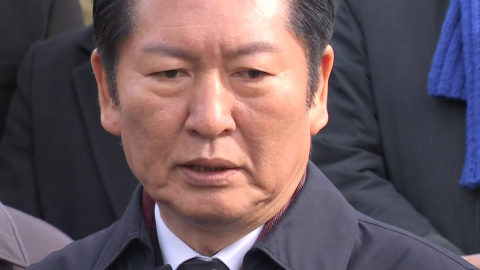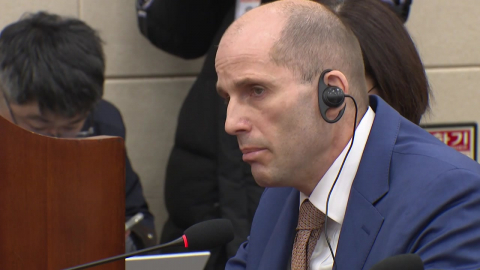-
정청래 "김병기, 지난달 25일 밤 9시 윤리감찰단에 조사 지시"…금품 의혹도 조사대상재생

-
민주당 정청래 대표가 김병기 전 원내대표에 대한 각종 ’갑질·특혜 의혹’에 대해 당 윤리감찰단에 이미 조사를 지시한 것으로 뒤늦게 확인됐습니다. 정 대표는 오늘(1일) 경남 김해 봉하마을에서 노무현 전 대통령 묘역을 참배한 뒤 기자들과 만나, 김 전 원내대표가 감찰 대상에서 빠진 이유를 묻는 말에 지난달 25일에 지시했다고 밝혔습니다. 그러면서 당내 지위고하를 막론하고 윤리감찰 대상이 되면 비껴갈 수 없다면서, 강선우 의원을 포함해 누구도 예외일 수 없고 성역일 수 없다고 강조했습니다. 정 대표는 끊어낼 것은 끊어내고, 이어갈 것은 이어가겠다고 덧붙였습니다. 정청래 대표가 윤리감찰을 지시한 시점은 김병기 의원이 ’원내대표직’을 맡고 있을 때로, 1억 원 금품수수 묵인 의혹은 알려지기 전입니다. 당 핵심 관계자들은 YTN 통화에서 정청래 대표가 지난달 25일 밤 9시에 윤리감찰을 지시했지만, 당시 현직 원내대표임을 감안해 공개하지 않았던 거라고 설명했습니다. 그러면서 이후 알려진 공천 헌금 묵인·방조 의혹 역시 감찰 대상이라고 봐야 한다며, 현재 당사자 조사 대신 실무조사가 진행되고 있다고 말했습니다. ※ ’당신의 제보가 뉴스가 됩니다’ [카카오톡] YTN 검색해 채널 추가 [전화] 02-398-8585 [메일] social@ytn.co.kr
-
새해부턴 ’법원의 시간’…윤석열·김건희 재판 11건재생

-
윤석열 전 대통령 부부를 정점으로 하는 특검 수사가 모두 끝나며, 심판과 공방의 무대는 법원으로 옮겨지게 됐습니다. 윤 전 대통령 부부는 재판 11건을 받고 있는데, 선고 기한이 정해진 만큼 새해부터 법원 심리도 빨라질 전망입니다. 취재기자 연결해 알아보겠습니다. 우종훈 기자! 윤 전 대통령 부부 선고는 언제입니까? [기자] 윤 전 대통령은 오는 16일, 김건희 씨는 28일 첫 선고를 앞두고 있습니다. 윤 전 대통령은 공수처 체포 방해와 계엄 국무회의 관련 국무위원 심의권 침해 혐의 등을 받고 있습니다. 앞서 결심에서 특검은 윤 전 대통령이 국가기관을 사유화하고도 반성은커녕 하급자들에게 책임을 전가하고 있다며 징역 10년을 구형했습니다. 윤 전 대통령은 59분 동안 이어진 최후진술에서 특검 공소장이 코미디 같다며 혐의를 부인했습니다. 배우자 김건희 씨는 도이치모터스 주가조작과 공천 개입, 통일교 금품 수수 혐의로 법원 판단을 기다리고 있습니다. 특검은 김 씨가 법 위에 서 있었다며 징역 15년을 선고해달라고 요청했습니다. [앵커] 윤 전 대통령 부부에 대한 재판은 이뿐 아니죠? [기자] 네, 윤 전 대통령 부부는 총 11건의 사건들로 재판에 넘겨진 상황입니다. 윤 전 대통령은 내란과 평양 무인기 침투 등 혐의로도 재판을 받고 있는데요. 가장 주목되는 건 내란 우두머리 혐의 재판입니다. 김용현 전 장관, 조지호 전 경찰청장 등 다른 피고인들과 사건을 병합한 재판부는 오는 9일 변론종결을 목표로 하고 있습니다. 김건희 씨 역시 고가의 금품을 대가로 인사나 공천 청탁을 들어준 혐의 등으로 기소된 상태라 줄줄이 재판이 이어질 예정입니다. 이 밖에도 내란 혐의를 받는 한덕수 전 총리는 21일, 통일교로부터 돈을 받은 혐의로 기소된 국민의힘 권성동 의원은 28일에 1심 선고를 앞두고 있습니다. 지금까지 사회부에서 YTN 우종훈입니다. ※ ’당신의 제보가 뉴스가 됩니다’ [카카오톡] YTN 검색해 채널 추가 [전화] 02-398-8585 [메일] social@ytn.co.kr







![[현장영상+] 민주당 봉하마을 참배…정청래 대표 ’약식 회견’](https://image.ytn.co.kr/general/jpg/2026/0101/202601011323434882_h.jpg)
![[현장영상+] 장동혁 "국민 삶 섬기면 지방선거 승리 따라올 것"](https://image.ytn.co.kr/general/jpg/2026/0101/202601011125189253_h.jpg)




















